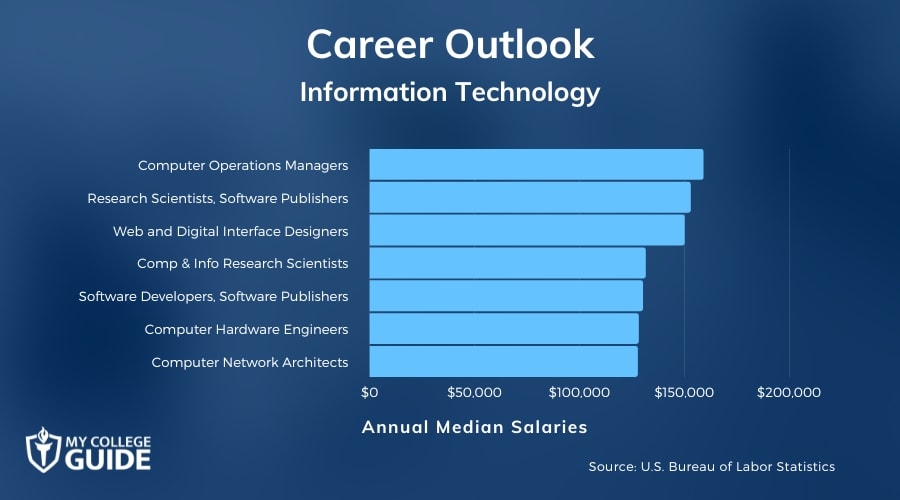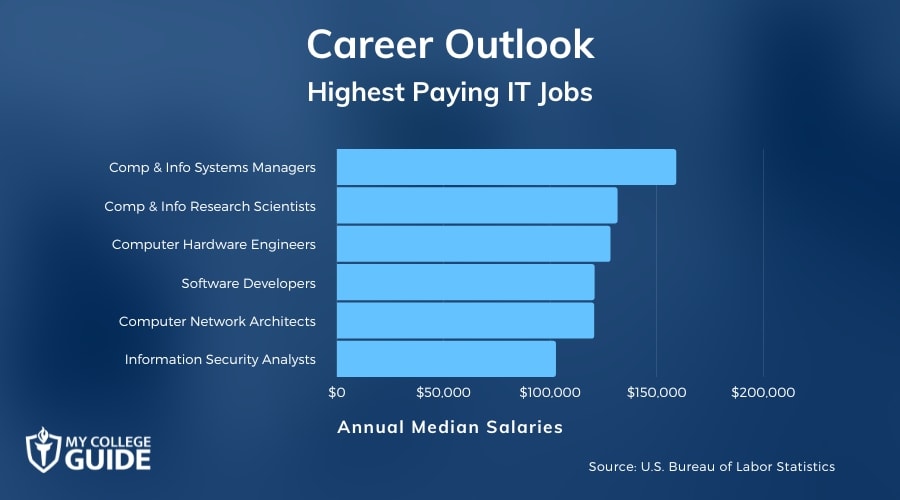The ever-expanding world of information technology (IT) has opened up a world of options in terms of various IT careers.

If you love working with computers and have a head for business, IT may be the right path for you. Earning an IT degree can allow you to apply for jobs in many industries.
Editorial Listing ShortCode:
With an IT degree, you could choose to work in the world of business as a database administrator, create new programs as a software developer, or even teach information technology as an IT professor.
What Can You Do With an Information Technology Degree?

The career paths available for IT degree holders offer a wide range of options, from entry-level computer support positions to professional management roles within a corporation. Information technology degrees offer the ultimate in flexibility with a number of concentrations available that can be customized to suit your interests and future goals.
If you have a creative side, you may want to use your IT degree to work in design. With an IT degree, you could qualify for jobs as a web or digital interface designer, or perhaps you prefer to use your skills to design new software. If you are more analytical and have a knack for organization, you may lean toward becoming a database architect or administrator where you can help create and manage various database solutions.
Editorial Listing ShortCode:
With an IT degree, you can also opt to work in the field of security as an information security analyst where you can help keep computer systems safe from cyber threats. The IT field is wide and vast with room for growth.
10 Things You Can Do with a Degree in Information Technology
If you are interested in careers in information technology, there are numerous opportunities you can explore to find a career that aligns with your interests.
Based on data from the U.S. Bureau of Labor Statistics (BLS), we have included 10 IT career paths, their education requirements, and projected job growth below.
1. Web Developer

Education Requirement: Associate’s or bachelor’s degree
Projected Job Growth: 23%
Web developers create and maintain websites and phone applications. Everything on a website, from the content to the appearance to how you find information, is designed and curated.
Web developers use coding languages, like HTML or Java, to create the user experience on the front end of the website and also manage the functions behind the scenes. As a web developer, your role may vary depending on the job, from managing an entire website to just certain pieces, such as the site’s appearance and user interface.
2. Information Security Analyst

Education Requirement: Bachelor’s degree
Projected Job Growth: 35%
IT security analysts are responsible for protecting an organization’s computer systems and networks to secure their information and data.
Security analysts can work in numerous industries, from government agencies to private companies, protecting them from hackers and cyber-attacks. In addition to troubleshooting problems as they arise, they also plan and test measures to proactively evaluate their security systems.
3. Computer Scientist

Education Requirement: Bachelor’s or master’s degree
Projected Job Growth: 21%
Computer scientists can use their skills in many innovative ways. Some may create new software that boosts efficiency, and others may improve the functionality of existing software. They are frequently relied upon to create new computing languages to improve hardware and software.
The work of a computer scientist can affect many other IT fields, as their improvements may result in faster computing, improved networking, and increased information and data security.
4. Network Administrator

Education Requirement: Bachelor’s degree
Projected Job Growth: 3%
Network administrators are responsible for maintaining an organization’s network on a daily basis. This daily management includes maintaining network-related hardware and troubleshooting network issues as they arise.
Network administrators have career opportunities in many industries, including educational institutions, hospitals, and government agencies.
5. Software Developer

Education Requirement: Bachelor’s degree
Projected Job Growth: 25%
Software developers design, create, implement, and maintain all software programs and computer applications. This can include improving and maintaining existing software or creating new software that functions specifically for a client’s or organization’s needs.
Editorial Listing ShortCode:
Most software developers work in computer systems design, with others working in finance and insurance, software publishing, and manufacturing.
6. Support Specialist

Education Requirement: Associate’s or bachelor’s degree
Projected Job Growth: 6%
Support specialists provide a wide range of technology support to organizations and their employees. Support positions can be a great way to gain experience and enter the IT field.
Support specialists are largely responsible for troubleshooting issues, including networking, hardware, and software, depending on the scope of the support provided. They may find employment in a range of industries providing support for a company’s product or service, or an organization may employ them to provide tech support for employees.
7. Data Scientist

Education Requirement: Bachelor’s or master’s degree
Projected Job Growth: 36%
Data scientists collect, organize, and analyze data to help their organizations make informed decisions. They also frequently translate their findings into visuals, such as charts and graphs, to make it easier for other employees to understand the data.
Data scientists may work in a wide variety of industries, including healthcare, education, sales, marketing, and finance, just to name a few.
8. Systems Analyst

Education Requirement: Bachelor’s degree
Projected Job Growth: 9%
System analysts review an organization’s current computer systems and identify opportunities for increasing efficiency.
System analysts need to understand how an organization uses its current technology, research ways different technologies can streamline its operations, and help implement these changes. They may work as consultants employed by IT or computer design firms, or work directly for an organization, sometimes as contractors.
9. Quality Assurance Tester

Education Requirement: Bachelor’s degree
Projected Job Growth: 25%
Quality assurance testers are responsible for running software checks on products and applications to ensure they run smoothly and meet industry standards.
They may also provide feedback to developers on a product or application, including their thoughts on its usability and functionality. They may also continue to test a product once it’s released, but after upgrades, and monitor it for any issues that may need to be fixed.
10. Database Administrator

Education Requirement: Bachelor’s degree
Projected Job Growth: 9%
Database administrators organize, secure, and maintain an organization’s data. They may be responsible for troubleshooting and fixing problems in their organization’s data infrastructure.
Editorial Listing ShortCode:
Database administrators frequently find employment in industries with large databases, such as insurance companies, hospitals, and educational institutions. Listed above are just some of the many satisfying and potentially lucrative IT career paths you may explore.
Common Types of Information Technology Careers

You’ll find many careers to pursue in information technology, with many falling into some common categories within the IT field.
Listed below are five types of information technology careers, what they focus on, and some fundamental skills that are helpful for you to have or want to develop in each area.
- Software Development: Focuses on creating software to meet a need. Skills required include problem-solving, math, programming languages, and attention to detail.
- Cyber Security: Focuses on keeping data secure. Skills required include computer forensics, problem-solving, communication, and an understanding of hacking.
- Data Management: Focuses on designing and maintaining data systems. Skills required include organization, attention to detail, basic programming skills, and critical thinking.
- IT Support: Provides technical support to users or other IT specialists. Skills required include communication, technical knowledge, problem-solving, and time management.
- Design: Brings together art and technology, from video game design to user interfaces. Skills required include creativity, communication, design software, and basic coding.
Whether your interest is creative or data-oriented, or somewhere in between, there is likely an IT field where you can use and enhance your current skills.
IT Careers & Salaries

There are a number of different career ideas and paths that you can take once you have earned a degree in information technology.
To give you an idea of the occupations most commonly found within this field, we have put together a list of the top 40 IT careers & salaries according to the data provided by the U.S. Bureau of Labor Statistics (BLS):
| Careers | Annual Median Salaries |
| Computer Operations Managers | $159,010 |
| Computer and Information Research Scientists, Software Publishers | $152,940 |
| Web and Digital Interface Designers, Software Publishers | $150,040 |
| Computer and Information Research Scientists | $131,490 |
| Software Developers, Software Publishers | $130,180 |
| Computer Hardware Engineers | $128,170 |
| Computer Network Architects, Insurance Carriers, and Related Activities | $127,710 |
| Operations Specialties Managers | $127,140 |
| Database Architects | $123,430 |
| Software Developers | $120,730 |
| Software Developers, Management Of Companies and Enterprises | $120,710 |
| Computer Network Architects | $120,520 |
| Software Developers, Quality Assurance Analysts, and Testers | $109,020 |
| Information Security Analysts, Finance and Insurance | $104,790 |
| Computer Network Architects, Telecommunications | $103,110 |
| Information Security Analysts | $102,600 |
| Computer Programmers, Software Publishers | $102,370 |
| Database Administrators, Computer Systems Design and Related Services | $101,000 |
| Computer Systems Analysts | $99,270 |
| Computer Programmers, Finance and Insurance | $99,260 |
| Computer Programmers, Manufacturing | $98,320 |
| Software Quality Assurance Analysts and Testers | $98,220 |
| Computer Systems Analysts, Information | $97,230 |
| Database Administrators | $96,710 |
| Information Security Analysts, Administrative and Support Services | $95,270 |
| Database Administrators, Information | $93,340 |
| Computer Programmers | $93,000 |
| Network and Computer Systems Administrators | $80,600 |
| Computer Systems Analysts, Government | $80,040 |
| Web Developers and Digital Designers | $78,300 |
| IT Professors | $77,910 |
| Web Developers | $77,030 |
| Computer Support Specialists, Telecommunications | $76,910 |
| Computer Network Support Specialists | $62,760 |
| Web and Digital Interface Designers, Retail Trade | $61,860 |
| Computer Training Specialists | $61,570 |
| Career and Technical Education Teachers | $61,160 |
| Computer User Support Specialists, Sofware Publishers | $59,830 |
| Computer Support Specialists | $57,910 |
| Computer User Support Specialists | $49,770 |
As with careers in history or journalism careers, there are a number of global and economic factors that play into the career outlook for information technology.
Technology is an integral component of the business world. With the demand for an effective online presence, the collection of big data, and the transition to cloud computing, employers are looking for educated professionals to help them efficiently and securely handle their information technology needs.
Editorial Listing ShortCode:
The information technology career outlook reflects this evolving demand for tech-savvy professionals. Over the next 10 years, the BLS projects that occupations in the computer and information technology sector will grow by 15%. Software developers are expected to see a 25% job growth over the same time period while IT security analysts will enjoy a 35% job growth.
As with most occupations, the average salary will vary based on the level of education required by the job, as well as the number of years you have worked in the field. With a positive job outlook and ever-evolving technology, pursuing a degree in information technology at a reputable university is an excellent way to jump-start in a sought-after career field.
How to Know if a Career in IT is Right for Me

As you consider if an IT career is the right path for you, it might be helpful to know what skills, traits, and characters most successful IT professionals have in common. While a career in IT is not for everyone, a wide range of skills and personality types can make it an appealing career for many people.
Some careers may require very specific skills, such as being able to program or having in-depth knowledge of coding. Other jobs may rely on your creativity and artistic ability. While you don’t need to possess all these skills, being strong in several areas can help.
With that said, some common skills and traits needed to be successful in the IT field include:
- Strong problem-solving skills
- Critical thinking
- Communication
- Organization and attention to detail
- Technical knowledge
- Logical thinking
- Adaptability
- Taking initiative
- Desire to learn new skills
- Decision-making
- Creativity (especially in design)
If you are a natural problem-solver, enjoy helping others, or are that “go-to” person when someone has a tech problem, an IT career may be an ideal career path for you.
Information Technology Licensure and Certifications

In addition to your degree and work experience, there are certifications you may pursue in the IT field to expand your career opportunities.
- CompTIA A+ certification: A great certification for beginners, it covers hardware, tech support, troubleshooting, security, networking, and more.
- Certified Information Systems Auditor (CISA): A cornerstone certification for IT security, it requires 5 years of professional experience in IT security.
- Cisco Certified Network Associate (CCNA): A networking certification that allows for specialization in areas including cloud, cyber operations, security, and more.
The IT field offers many certifications you can pursue in your area of interest, including networking, security, management, cloud computing, and IT support.
Is Financial Aid Available?

As you explore careers in information technology fields, consider that there may be opportunities for financial assistance. If you are currently employed in an IT field, your employer may offer financial assistance for continuing education in a related field.
You may look into funding opportunities through various state and federal loans and grants. While loans typically need to be repaid, grants usually do not. There may also be work-study programs that allow you to work part-time in order to help pay for your IT program.
Editorial Listing ShortCode:
To learn more about different financial opportunities that may be available to you, you may visit the Federal Student Aid website and start by filling out the Free Application for Federal Student Aid (FAFSA).
What Is an Information Technology Degree?

An information technology (IT) degree is a degree program that teaches students the various concepts and components of IT and computer programming.
While the constant evolution of technology has made computer and network systems essential components for businesses, there are a number of different responsibilities and roles that can be found within an IT career. From corporate data security to writing, designing, and production technologies, there are countless ways to utilize an IT degree.
Below are a few of the common courses that you may find while pursuing your degree in information technology:
- Java Programming
- Networking and Business Systems
- Web Design and Development
- Project Planning
- Computer Programming
- Information Assurance and Security
- Management and Leadership Skills
Whether you choose to pursue an associate’s degree to give you an edge in the job market or are working towards a graduate-level IT degree, the skills that you acquire in this program will help prepare you for a career in business and information technology.
If you are searching for a program that will allow you to maintain your current work schedule or family obligations, you’re in luck. Many of the nation’s top universities now offer online information technology degrees that provide the flexibility you need for your busy life.
Is Information Technology a Good Career Path?

Yes, information technology is a good career path for many professionals. Based on information from the BLS, many IT jobs pay higher-than-average salaries with projected faster-than-average growth compared to other jobs. For example, database administrators earn an annual median salary of $101,000 and are expected to see a 9% growth rate over the next decade.
Editorial Listing ShortCode:
Web developers and digital designers earn $78,300 per year and are expected to see a 23% increase in job growth over the next 10 years. Almost every industry relies on technology and requires individuals with the skills needed, including support roles, manager positions, security, analysis, and graphic design.
What Are the Highest Paying IT Jobs?

Career opportunities and their salaries vary based on many factors, including where you live and your prior work experience. Based on information from the BLS, listed below are some of the highest-paying IT jobs.
| Careers | Annual Median Salaries |
| Computer and Information Systems Managers | $159,010 |
| Computer and Information Research Scientists | $131,490 |
| Computer Hardware Engineers | $128,170 |
| Software Developers | $120,730 |
| Computer Network Architects | $120,520 |
| Information Security Analysts | $102,600 |
Based on data from the BLS, the median wage for computer and information technology workers is $85,000.
What’s the Difference Between Computer Science vs. Information Technology?
Even though computer science and information technology, there are a few key distinctions between the two subjects.
| Computer Science | Information Technology |
|
|
It may be easier to enter the IT field, especially at an entry level, since the degree and experience may be less strict than in computer science.
Is an IT Degree Worth It?

Yes, an IT degree is worth it for many professionals. The skills and knowledge you gain from earning an IT degree can be applied to jobs in almost every industry.
Editorial Listing ShortCode:
IT professionals may find employment in education, healthcare, government agencies, IT and computer firms, marketing, sales, advertising, and security. According to the BLS, careers such as information security analysts and data scientists are projected to grow by over 30% over the next 10 years.
Getting Your IT Degree Online

A career in information technology fields may be ideal for you if you enjoy working with technology, are a problem-solver, and have good communication skills and attention to detail.
With a range of career possibilities in areas including graphic design, cyber security, data management, software development, and IT support, the IT field holds many possibilities. With numerous certifications you can also earn in IT, you can continue to develop your skills and increase your earning potential.
If you wish to pursue the opportunities that may be available with an IT degree, you may look into IT degrees online from accredited universities.
